A special session entitled Presidents’ Panel on the Future of Higher Education (HE) in the Philippines was held on the last day of NCODeL 2022, 25 November 2022 at 9:00 a.m. The panelists were the seven founding member universities of the Consortium of Open Distance Education Providers in the Philippines (CODEPP) which was established on 17 August 2022. These were the University of the Philippines Open University (UPOU), Benguet State University (BSU), Cavite State University (CvSU), Don Mariano Marcos Memorial State University (DMMMSU), Ifugao State University (IFSU), Mariano Marcos State University (MMSU), and John B. Lacson Foundation Maritime University (JBLFMU).
For this session, higher education institutions (HEIs) presidents, vice presidents, and administrators shared their thoughts on the future of HE in the country drawing on their pre-pandemic experience of delivering programs in distance education (DE) mode and how their experience during the time of the Covid-19 pandemic provided new perspectives and mindsets in consideration of the new dynamics that shaped and influenced the HE system.
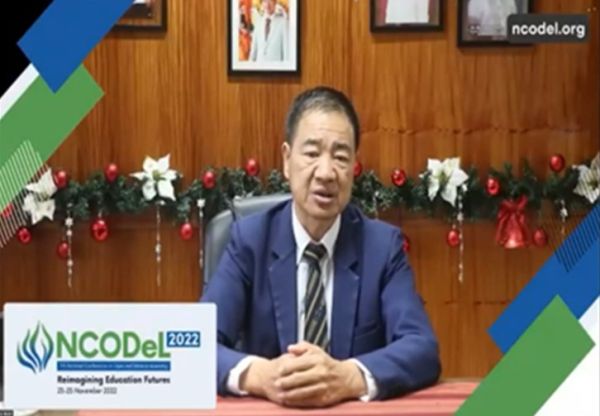
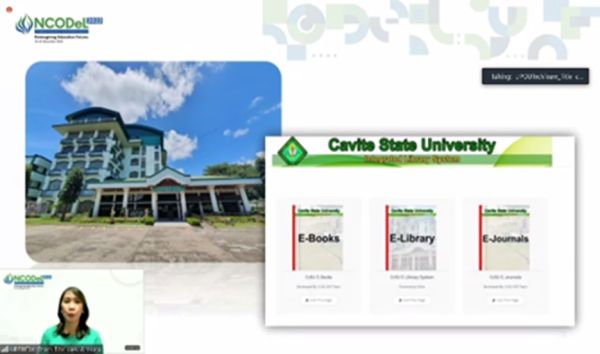
Dr. Felipe S. Comila, BSU’s seventh and current President, was the first one to share his thoughts on the future of HE through DE. He said that the theme of the conference, Reimagining Education Futures, was very timely because the participants would be apprised of the next direction that they should take regarding DE. He urged the DE professors to continue doing research work on the online universe, for it’s the future of education. He also challenged the same to redefine and modify class schedules so that daily enrolment and graduation could be made possible in the future to address the education needs of the working class and businessmen. He thanked UP/UPOU for leading the DE professors in addressing the challenges of these times.
The next presenter was Dr. Ma. Agnes P. Nuestro, Vice President for Academic Affairs of CvSU who represented Dr. Hernando D. Robles, President of CvSU. Her presentation was entitled Future of Higher Education in the Philippines: Journey of Cavite State University towards Flexible Learning Mode in Teaching. She said that with the abrupt shift to flexible learning, they followed the recommendation of the Commission on Higher Education (CHED) and redesigned their syllabi to fit the alternative modes of learning using digital and non-digital modes of teaching and learning. They also adjusted their schedules to accommodate online and offline activities. To understand their students, they conducted a survey on students’ internet connectivity and available gadgets that can be used to access learning materials. Teachers underwent capability enhancement training where a webinar series on course design and delivery for flexible learning arrangements was conducted. They also used Moodle and other technological platforms to improve their e-learning system. Moreover, they fast-tracked and upgraded their e-library. Lastly, Dr. Nuestro said that the CvSU community prides itself to be one of the founding partners of CODEPP and strongly commits to being a productive partner to achieve its goals.
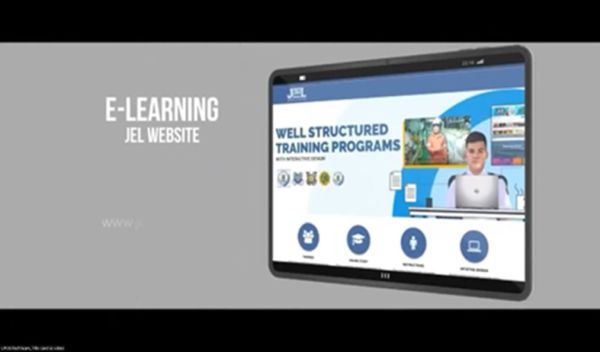
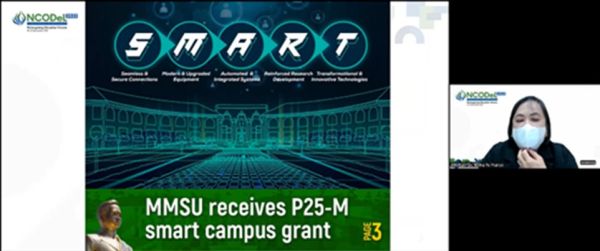
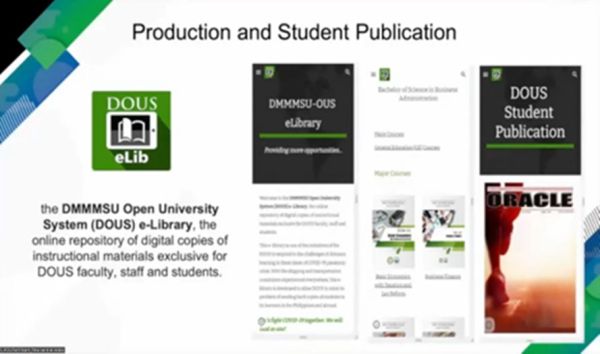
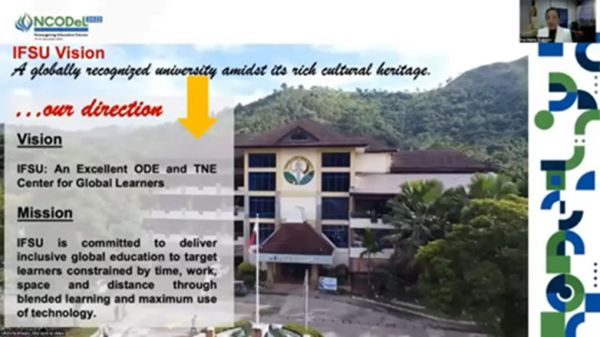
The third speaker was Dr. Elsie M. Pacho, Vice President for Academic Affairs of DMMMSU who presented on behalf of Dr. Jaime I. Manuel, Jr., President of DMMMSU. Her presentation was entitled Moving Forward the New Normal: DMMMSU’s Best Practices. Dr. Nuestro said that DMMMSU has been delivering distance education through its Open University for 26 years now. Some of their best practices that she discussed included the adaption of new learning platforms like Google Classrooms, Google Meet, and Easy Tool, and the creation of programs like Life Coach On-Air, eOpenU, and iScool that were streamed live and tackled topics on student welfare services, student development, institutional student programs and services, spiritual matters, health and wellness, and students’ rights and safety. They also launched their e-Library, the Ask DMMMSU Online Reference Library Assistant or AskDORLA, and the Online Public Access Catalogue (OPAC). Extension services through mass media platforms were also done. Moreover, DMMMSU built state-of-the-art infrastructure projects equipped with cutting-edge tools, equipment, machinery, and a highly functional information and communication technology (ICT) system geared towards becoming a smart campus with a 10G-ready campus area network. Most importantly, their teachers were also trained in Google Classroom, content development, basic occupation education, human resource development, workplace diversity, gender diversity, social inclusion, and virtual customer service.
Dr. Eva Marie Codamon-Dugyon, President of IFSU, did the fourth presentation entitled “Boble” ad IFSU: Distance Education as the Future University. Boble stands for the borderless opportunity for local and global learners and it is a local term that means a community or village of someone’s place of origin that shares the same culture, beliefs, and practices. Dr. Dugyon said that in the context of the DE program of IFSU, it implies giving a home and hope as well as their oneness in bringing forth education to all people who are constrained by time, work, space, and distance through blended learning and maximizing available technology. Dr. Dugyon added that IFSU has been delivering DE since 2006 through a traditional correspondence modality. With the advent of the internet, IFSU started offering blended learning in 2015 and this paved for the creation of a college that oversaw its management. In connection with this, they established their Learning Management System (LMS) with a registered domain and a full-time LMS administrator. In 2019, IFSU started offering full online instruction. In addition, they have subscribed to Zoom and Google, and the Smart Campus project is also underway. She further added that IFSU is grateful for the support and shepherding that UPOU has been giving them through faculty training/workshops and technical assistance.
The fifth presenter was Captain Alfred Espinosa, Administrator of JBLFMU, who presented JBLFMU’s e-Learning: Anytime, Anywhere program on behalf of Dr. Ronald Raymond L. Sebastian, Chief Executive Officer (CEO) of JBLFMU, the only maritime university in the country. According to Capt. Espinosa, JBLFMU has been offering online distance learning since 1999 and it is the first maritime institution to explore the concept of modular and digital learning through its DE program with its graduate school in the year 2000. With funding from the Canadian International Development Authority (CIDA) in 2008 through a tripartite agreement, their e-learning capability was boosted. In addition, institutional development and innovation project grants from CHED in 2018, allowed them to avail of the Blackboard LMS that was used for their delivery of instructions. The Covid-19 pandemic stirred them to fully transition to e-learning and adapt and provide user-friendly web design and modern learning methodologies in 2020. This helped them in their compliance with the international convention on Standards of Training Certification and Watchkeeping (STCW) for seafarers 2010-Manila Amendments that required modern learning methodology including distance learning and web-based learning.
Dr. Prima Fe Franco, Vice President for Academic Affairs, of MMSU was the sixth presenter and she represented Dr. Shirley C. Agrupis, President of MMSU. Her presentation was entitled The Digital Transformation in Education: The MMSU Experience. According to Dr. Franco, with the onset of the Covid-19 pandemic, MMSU launched Saranay against Covid-19 program in April 2020 in response to the emerging needs of their community. Saranay is a local term that means aid or support. Then, MMSU recalibrated its service delivery to make teaching and learning possible under a highly flexible modality which paved the way for the creation of the Flexible Learning Hub. With support from CHED, this facility was improved and was inaugurated in August 2021 with its new name Center for Flexible Learning (CFL) which was promoted as a safe and state-of-the-art co-learning space for students. To be able to provide equitable access to learning for the financially and technologically advantaged students, MMSU forged an agreement with different LGUs and telecom providers to put up locally-based learning spaces that were well-equipped, safe, and accessible outside MMSU. They also leveraged their existing MMSU Virtual Learning Environment (mVLE) and trained all their teachers on how to use it and other teaching tools. Non-teaching staff was also trained in the use of online collaboration tools. MMSU also a received a PhP25 million grant from the government to transform its campus into a SMART campus.
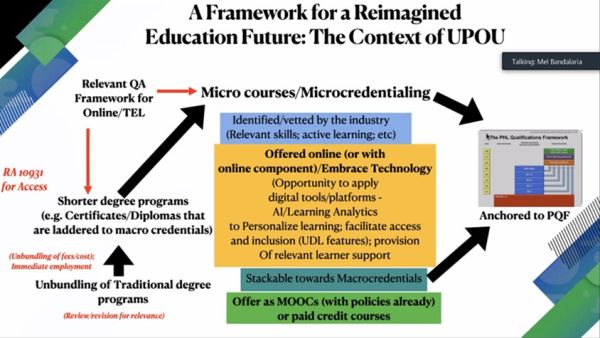
Last but not least, the seventh presenter was Dr. Melinda dela Peña Bandalaria, Chancellor of UPOU and the session panel chairperson. Her presentation was entitled From Buzzwords to a Framework for a Reimagined Education Future. According to Dr. Bandalaria, there are four trends that will shape the future of HE as seen by the World Economic Forum. These are: 1) learning from everywhere that allows for truly immersive and experiential learning; 2) replacing lectures with active learning that relies on the principles of spaced learning, emotional learning, and the application of knowledge; 3) teaching skills that remain relevant in a changing world; 4) using formative assessment instead of high-stake exams. Consequently, the framework for the reimagined future should focus on offering and strengthening micro-credentialing by unbundling traditional degree programs, embracing and optimizing technology and human interaction to reach more people, personalizing content, and offering micro-courses. These micro-courses should have already been identified and vetted by the industry, are offered online or with an online component, are stackable towards macro-credentials, and can be offered as MOOCs (massive open online courses) or paid credit courses. They should also be anchored to the Philippines Qualifications Framework (PQF). She further said that universities should take advantage of the “Great Reset” or the post-Covid-19 era to rethink how they now fit in their communities and how these communities can play a role in shaping the future of their institutions.
Dr. Myra C. Almodiel, Director of the Office of Public Affairs (OPA) of UPOU served as the moderator for this session.
Written by the NCODeL 2022 Publicity Committee







